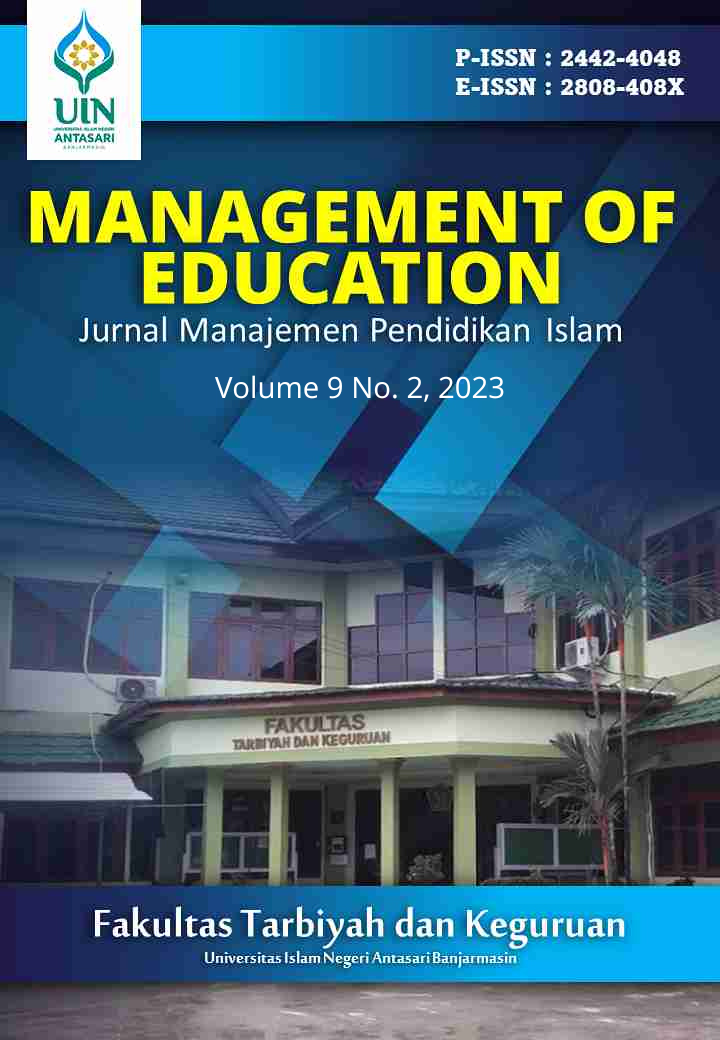PENGARUH SISTEM INFORMASI MANAJEMEN TERHADAP KINERJA ASN PADA BADAN KEPEGAWAIAN DAN PENGEMBANGAN SUMBER DAYA MANUSIA KABUPATEN KARO
DOI:
https://doi.org/10.18592/moe.v9i2.9694Keywords:
Management Information System, Employee PerformanceAbstract
This study aims to find out and examine whether there is an effect of implementing management information systems on employee performance at the Karo Regency Personnel and Human Resource Development Agency. This study used descriptive quantitative methods, research data were collected using questionnaires in the form of checklists, observations and documentation. the data was analyzed using descriptive statistics with a simple linear regression formula, the data is explained in tabular form, frequency, narrative of the processed data with the help of SPSS 16. The results of the study show that the implementation of the management information system has been going well but there are still obstacles in its application such as inadequate facilities and infrastructure Lack of skills from employees who do not clearly understand how to use this management information system application, there must be an acc system from data processing which can hinder work, because they still have to wait for the acc. Judging from the results of the study, it shows that the implementation of management information systems on employee performance has been going well and has a partial effect, there is one indicator that has the greatest influence on work productivity, namely the delivery of information. This can be seen from the results of the partial linear regression test, namely data collection of 0.056 and from the results of the simultaneous linear regression test, it has an effect of 0.464 or 46.4% which affects work productivity, the rest is influenced by other variables that have not been examined by researchers.References
Cucus, Ahmad, and Yuthsi Aprilinda. (2012). Pengembangan E-Learning Berbasis Multimedia Untuk Efektivitas Pembelajaran Jarak Jauh. Jurnal Sistem informasi dan telematika, 7(1).
Fadhillah, N. . (2022). Persepsi Pegawai Terhadap Informasi Administrasi Manajemen Pesantren Bidang Pakis Kantor Wilayah Kementrian Agama Sumatera Utara. Sibatik Journal: Jurnal Ilmiah Bidang Sosial, Ekonomi, Budaya, Teknologi, Dan Pendidikan, 1(4), 411–416. https://doi.org/10.54443/sibatik.v1i4.45
Jogiyanto, H. M. (2002). Dasar Ilmu Komputer Pemrogaman Sistem Informasi Dan Integrasi Buatan, Andi, Yogyakarta.
Liswatin, L. (2022). Inovasi Pengelolaan Pajak Dan Retribusi Daerah Dalam Peningkatan Pendapatan Asli Daerah Di Kabupaten Konawe. Sibatik Journal: Jurnal Ilmiah Bidang Sosial, Ekonomi, Budaya, Teknologi, Dan Pendidikan, 1(3), 83–96. https://doi.org/10.54443/sibatik.v1i3.15
Nuur Rasyidah, A. ., Bariroh, A. ., & Emi Rahmawati, D. . (2022). Analisis Total Quality Management (TQM) Dalam Meningkatkan Mutu Manufaktur Dan Jasa Pada PT. Dahana (Persero) Subang. Sibatik Journal: Jurnal Ilmiah Bidang Sosial, Ekonomi, Budaya, Teknologi, Dan Pendidikan, 1(12), 2917–2926. https://doi.org/10.54443/sibatik.v1i12.475
Pangestu, Danu Wira. (2007). Teori Dasar Sistem Informasi Manajemen (SIM). IlmuKomputer.com
Rosyidi, S. (2007). Pengantar Teori Ekonomi. Pendekatan Kepada Teori Mikro dan Makro. Jakarta: PT Raja Grafindo Persada.
Suebu, E. . (2022). Analisis Risiko Operasional Media Sosial Bkkbnofficial Pada Badan Kependudukan Dan Keluarga Berencana Nasional. Sibatik Journal: Jurnal Ilmiah Bidang Sosial, Ekonomi, Budaya, Teknologi, Dan Pendidikan, 1(10), 2241–2246. https://doi.org/10.54443/sibatik.v1i10.324
Downloads
How to Cite
Issue
Section
License
Authors who publish with this journal agree to the following terms:
- Authors retain copyright and grant the journal right of first publication with the work simultaneously licensed under a Creative Commons Attribution 4.0 International that allows others to share the work with an acknowledgement of the work's authorship and initial publication in this journal.
- Authors are able to enter into separate, additional contractual arrangements for the non-exclusive distribution of the journal's published version of the work (e.g., post it to an institutional repository or publish it in a book), with an acknowledgement of its initial publication in this journal.
- Authors are permitted and encouraged to post their work online (e.g., in institutional repositories or on their website) prior to and during the submission process, as it can lead to productive exchanges, as well as earlier and greater citation of published work.









 This work is licensed under a
This work is licensed under a 